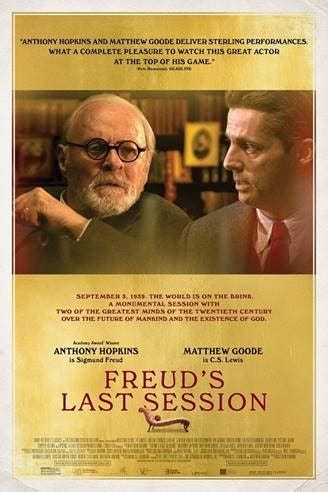What I'm Watching: Freud's Last Session
Starring Anthony Hopkins as Sigmund Freud and Matthew Goode as C. S. Lewis. Written by Mark St. Germaine. Directed by Matt Brown.
A title card at the conclusion of this movie tells us that, a few days before his death, Sigmund Freud had a meeting scheduled with an Oxford don whose identity is lost to history. The script imagines that it might have been C. S. Lewis, and offers up the conceit that, on this day of the outbreak of World War II, the noted Christian writer and the atheist psychologist discussed the question of the existence of God.
Screenwriter Mark St. Germain, who based it on his stage play, uses this speculative meeting as a way of dramatizing this well-worn debate without bringing any fresh insights. I suppose it’s a perfectly adequate introduction to the basic points of contention, for anyone who has never encountered this dispute before. But it drops its philosophical points like sound-bites without making the effort to develop any kind of an argument.
One of the most disappointing examples of this comes when Lewis challenges Freud’s assertion that religious belief is nothing more than a psychological disorder. Freud throughout is suffering from the pain of a cancer in his jaw, and the script makes convenient use of this to distract Freud from pursuing this line of argument.
The real-life Lewis once presented the psychological question of the Christian belief in the starkest of terms:
You must make your choice: either this man was, and is, the Son of God, or else a madman or something worse. You can shut him up for a fool, you can spit at him and kill him as a demon; or you can fall at his feet and call him Lord and God. But let us not come with any patronizing nonsense about his being a great human teacher. He has not left that open to us. He did not intend to.
It feels to me like a missed opportunity that this script did not give Lewis and Freud the opportunity to dig into this more deeply.
I don’t typically like criticizing a creative work for making different decisions than I would have. But in this case it does feel like a missed “Chekhov’s Gun” opportunity. Here the gun was presented, acknowledged, then stuck in a drawer never to be referenced again.
The debate eventually settles into the well-worn and familiar question of why God allows suffering in the world. It’s a question Lewis tackles in some depth later in life, but as the young man at the time this movie takes place he’s not yet ready for it.
Which leaves me wanting to revisit the film Shadowlands, as a kind of philosophical sequel. Anthony Hopkins takes on the role of C. S. Lewis, wrestling with the very questions posed by Anthony Hopkins as Freud.


